2018全国二卷听力原文
2018年高考英语全国2卷听力
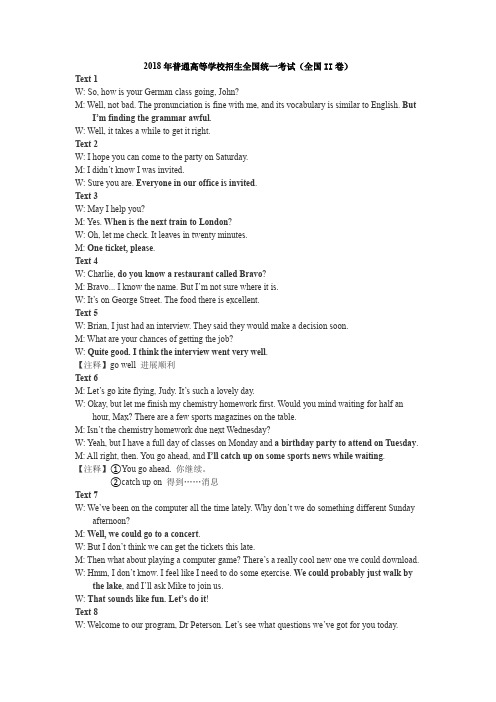
2018年普通高等学校招生全国统一考试(全国II卷)Text 1W: So, how is your German class going, John?M: Well, not bad. The pronunciation is fine with me, and its vocabulary is similar to English. But I’m finding the grammar awful.W: Well, it takes a while to get it right.Text 2W: I hope you can come to the party on Saturday.M: I didn’t know I was invited.W: Sure you are. Everyone in our office is invited.Text 3W: May I help you?M: Yes. When is the next train to London?W: Oh, let me check. It leaves in twenty minutes.M: One ticket, please.Text 4W: Charlie, do you know a restaurant called Bravo?M: Bravo... I know the name. But I’m not sure where it is.W: It’s on George Street. The food there is excellent.Text 5W: Brian, I just had an interview. They said they would make a decision soon.M: What are your chances of getting the job?W: Quite good. I think the interview went very well.【注释】go well 进展顺利Text 6M: Let’s go kite flying, Judy. It’s such a lovely day.W: Okay, but let me finish my chemistry homework first. Would you mind waiting for half an hour, Max? There are a few sports magazines on the table.M: Isn’t the chemistry homework due next Wednesday?W: Yeah, but I have a full day of classes on Monday and a birthday party to attend on Tuesday. M: All right, then. You go ahead, and I’ll catch up on some sports news while waiting.【注释】①You go ahead. 你继续。
2018年高考英语听力(全国II卷)试题及录音原文

2018年高考英语听力(全国II卷)试题及录音原文第一节(共5小题;每题1.5分,满分7.5分)听下边5段对话。
每段对话后有一个小题,从题中所给的A、B、C三个选项中选出最正确选项。
听完每段对话后,你都有10秒钟的时间往返答相关小题和阅读下一小题。
每段对话仅读一遍。
1. What will the woman do this afternoon?A. Do some exercise. .B. Go shopping.C. Wash her clothes.2. Why does the woman call the man?A. To cancel a flight.B. To make an apology.C. To put off a meeting.3. How much more does David need for the car?A. $5,000.B. $20,000.C. $25,000.4. What is Jane doing?A. Planning a tour.B. Calling her father.C. Asking for leave.5. How does the man feel?A. Tired.B. Dizzy.C. Thirsty.第二节听下边5段对话或独白。
每段对话或独白后有几个小题,从题中所给的A、B、C三个选项中选出最正确选项,听每段对话或独白前,你将有时间阅读各个小题,每题5秒钟;听完后,各小题将给出5秒钟的作答时间。
每段对话或独白读两遍。
听第6段资料,回答第6、7题。
6. What does Jack want to do?A. Watch TV.B. Play outside.C. Go to the zoo.7. Where does the conversation probably take place?A. At home.B. In a cinema.C. In a supermarket.听第7段资料,回答第8至10题。
2018年普通高等学校招生全国统一考试(课标全国卷Ⅱ) 听力试题及答案
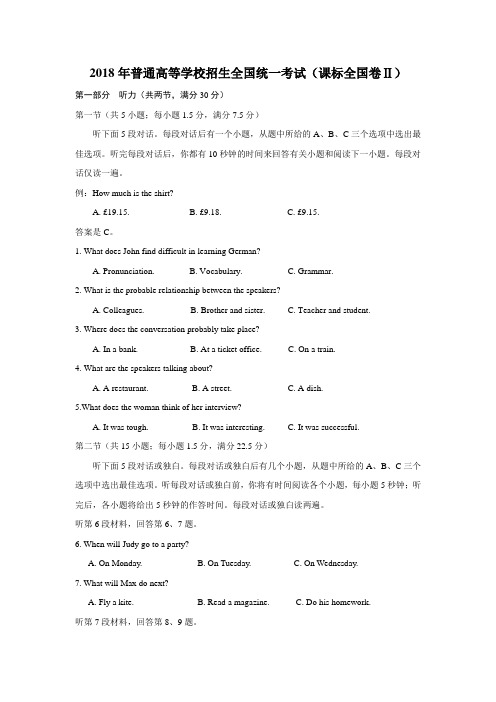
2018年普通高等学校招生全国统一考试(课标全国卷Ⅱ)第一部分听力(共两节,满分30分)第一节(共5小题;每小题1.5分,满分7.5分)听下面5段对话。
每段对话后有一个小题,从题中所给的A、B、C三个选项中选出最佳选项。
听完每段对话后,你都有10秒钟的时间来回答有关小题和阅读下一小题。
每段对话仅读一遍。
例:How much is the shirt?A. £19.15.B. £9.18.C. £9.15.答案是C。
1. What does John find difficult in learning German?A. Pronunciation.B. Vocabulary.C. Grammar.2. What is the probable relationship between the speakers?A. Colleagues.B. Brother and sister.C. Teacher and student.3. Where does the conversation probably take place?A. In a bank.B. At a ticket office.C. On a train.4. What are the speakers talking about?A. A restaurant.B. A street.C. A dish.5.What does the woman think of her interview?A. It was tough.B. It was interesting.C. It was successful.第二节(共15小题;每小题1.5分,满分22.5分)听下面5段对话或独白。
每段对话或独白后有几个小题,从题中所给的A、B、C三个选项中选出最佳选项。
听每段对话或独白前,你将有时间阅读各个小题,每小题5秒钟;听完后,各小题将给出5秒钟的作答时间。
2018年普通高等学校招生全国统一考试(课标全国卷Ⅱ) 听力试题及答案
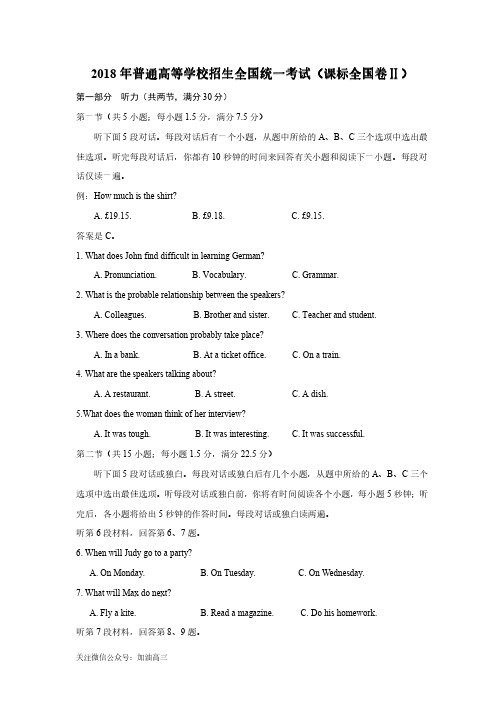
一考试(课标全国卷国卷国卷ⅡⅡ)一考试(课标全全国统一考试(课标全2018 年普年普通高等学校招生通高等学校招生全国统通高等学校招生全国统30第一部分听力(共两节,满分分)5 小题 1.5 7.5 分)第一节(共;每小题分,满分听下面段对话。
每段对话后有一个小题,从题中所B C5给的A、、三个选项中选出最10佳选项。
听完每段对话后,你都有秒钟的时间来回答有关小题和阅读下一小题。
每段对话仅读一遍。
例:How much is the shirt?B. C.A. £19.15. £9.18. £9.15.答案是C。
1. What does John find difficult in learning German?B. C.A. Pronunciation. Vocabulary. Grammar.2. What is the probable relationship between the speakers?B. C. Teacher and student.A. Colleagues. Brother and sister.3. Where does the conversation probably take place?A. In a bank.B. At a ticket office.C. On a train.4. What are the speakers talking about?B. C.A.A restaurant. A street. A dish.5.What does the woman think of her interview?gh B. C. It was successful.A. It was tou. It was interesting.15小题 1.5 22.5第二节(共;每小题分,满分分)5A、、B C 三个听下面段对话或独白。
2018年高考英语全国2卷(附答案和听力原文)
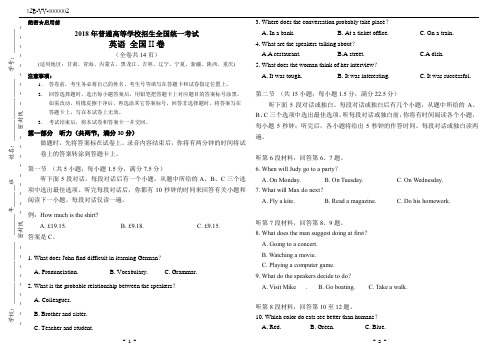
学校:____________________ _______年_______班 姓名:____________________ 学号:________- - - - - - - - - 密封线 - - - - - - - - - 密封线 - - - - - - - - -绝密★启用前2018年普通高等学校招生全国统一考试英语 全国II 卷(全卷共14页)(适用地区:甘肃、青海、内蒙古、黑龙江、吉林、辽宁、宁夏、新疆、陕西、重庆) 注意事项:1.答卷前,考生务必将自己的姓名、考生号等填写在答题卡和试卷指定位置上。
2. 回答选择题时,选出每小题答案后,用铅笔把答题卡上对应题目的答案标号涂黑。
如需改动,用橡皮擦干净后,再选涂其它答案标号,回答非选择题时,将答案写在答题卡上,写在本试卷上无效。
3.考试结束后,将本试卷和答案卡一并交回。
第一部分 听力(共两节,满分30分)做题时,先将答案标在试卷上。
录音内容结束后,你将有两分钟的时间将试卷上的答案转涂到答题卡上。
第一节 (共5小题;每小题1.5分,满分7.5分)听下面5段对话。
每段对话后有一个小题,从题中所给的A 、B 、C 三个选项中选出最佳选项。
听完每段对话后,你都有10秒钟的时间来回答有关小题和阅读下一小题。
每段对话仅读一遍。
例:How much is the shirt?A. £19.15.B. £9.18.C. £9.15.答案是C 。
1. What does John find difficult in learning German ? A. Pronunciation.B. Vocabulary.C. Grammar.2. What is the probable relationship between the speakers ? A. Colleagues. B. Brother and sister. C. Teacher and student.3. Where does the conversation probably take place ?A. In a bank.B. At a ticket office.C. On a train. 4. What are the speakers talking about ? A.A restaurant. B.A street.C.A dish.5. What does the woman think of her interview ?A. It was tough.B. It was interesting.C. It was successful.第二节 (共15小题;每小题1.5分,满分22.5分)听下面5段对话或独白。
(完整)2018高考全国卷2,3英语听力试题及原文
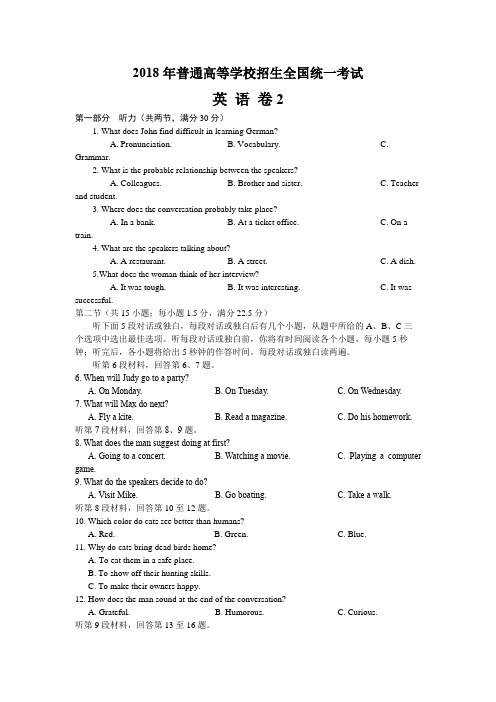
2018年普通高等学校招生全国统一考试英语卷2第一部分听力(共两节,满分30分)1. What does John find difficult in learning German?A. Pronunciation.B. Vocabulary.C. Grammar.2. What is the probable relationship between the speakers?A. Colleagues.B. Brother and sister.C. Teacher and student.3. Where does the conversation probably take place?A. In a bank.B. At a ticket office.C. On a train.4. What are the speakers talking about?A. A restaurant.B. A street.C. A dish.5.What does the woman think of her interview?A. It was tough.B. It was interesting.C. It was successful.第二节(共15小题;每小题1.5分,满分22.5分)听下面5段对话或独白,每段对话或独白后有几个小题,从题中所给的A、B、C三个选项中选出最佳选项。
听每段对话或独白前,你将有时间阅读各个小题,每小题5秒钟;听完后,各小题将给出5秒钟的作答时间。
每段对话或独白读两遍。
听第6段材料,回答第6、7题。
6. When will Judy go to a party?A. On Monday.B. On Tuesday.C. On Wednesday.7. What will Max do next?A. Fly a kite.B. Read a magazine.C. Do his homework.听第7段材料,回答第8、9题。
2018全国二卷英语听力及原文

2018全国二卷英语听力及原文全文共6篇示例,供读者参考篇1The 2018 National English Listening Test Volume 2Hi there! My name is Emma and I'm a 5th grader. I just took the 2018 National English Listening Test Volume 2 and I wanted to share my experience with you.The test was pretty long, but I was excited because I've been practicing my English listening skills a lot this year. My teacher said it's really important to learn to understand spoken English well. She said it will help me communicate better with people from other countries when I'm older.The first part of the test had some simple conversations between two people. One conversation was about a girl named Lily who was looking for her missing pencil case. Another one was about two friends deciding what game to play at recess. I thought those were fairly easy to understand.Then there were some longer conversations that were a little trickier. One was about a brother and sister arguing over whogot to use the computer first after school. Another one was about a mom telling her son the schedule for his activities that week. I had to listen really carefully to catch all the details in those ones.After that, there were some passages that a teacher or narrator read out loud. We had to listen and answer comprehension questions about them. One passage was about how camels are well-adapted for living in the desert with their big humps and oval-shaped red blood cells. That one was fascinating! I love learning about animals.Another passage described the process of how maple syrup is made by tapping maple trees and boiling down the sap. It was kind of like a set of instructions. Those types of passages were pretty difficult because there were a lot of facts and steps to remember.I also remember a story passage about two boys who entered their school's talent show - one played the violin while the other did some comedy routines. The violin player got stage fright at first but his friend helped calm him down. It was an amusing little story.The last section had recordings of people giving directions or providing information. Like when someone explained therules for riding the school bus, or the procedure for checking out library books. Those were pretty straightforward but you had to listen precisely.Overall, I feel like I did pretty well on the test, though I know I probably missed some questions here and there. Listening tests are hard because you only get one chance to hear everything. You can't relisten or reread parts you didn't understand the first time.My favorite part was learning the fun facts about camels and maple syrup production. My least favorite was feeling nervous during the story passage in case I missed any important details about what happened.English listening is such an important skill though. If I want to travel the world someday, I'll need to understand people from England, Australia, America and everywhere else. This test was great practice for that.I'm glad my school and my teachers care about helping us improve our English abilities. With enough hard work and listening practice, I know I can get really good at understanding spoken English. Then I'll be ready to make friends all over the world! Maybe I'll even become an international tour guide when I grow up. Who knows?Well, thanks for reading about my experience. Let me know if you've ever taken an English listening test before and how it went. Study hard and practice listening as much as you can. Before you know it, you'll be an expert listener in English!篇22018 National English Exam Volume 2 Listening TranscriptHi everyone! My name is Lily and I'm going to tell you all about the listening part of the big English test I took last year when I was in 5th grade. It was pretty long but I'll try my best to remember everything!First up was a conversation between a boy and a girl about after-school activities. The boy was asking the girl what fun clubs or sports she does after classes end. The girl said she is part of the art club where they get to paint pictures and make crafts. She said it's a lot of fun and lets her be creative. The boy responded that he takes karate lessons to learn self-defense and stay active. He said karate is cool because you get to break boards with your hands and feet!Next there was a mom talking to her son about summer camp options. The mom listed out a few choices like soccer camp, computer camp, and outdoor adventure camp. Her son seemedmost excited about the outdoor camp where you go hiking, canoeing on lakes, and roast marshmallows around the campfire. The mom reminded him he would have to follow all the safety rules if he wants to go to that camp.After that was a teacher giving instructions to her class before they went on a field trip to a science museum. She said they would first watch an awesome 3D movie about outer space at the planetarium. Then they'd explore exhibits on dinosaurs, the human body, and inventions. The teacher reminded everyone to stay with their small groups and not wander off. She said she couldn't wait to learn cool new facts!The last conversation was between two friends making weekend plans. One friend suggested going to the new trampoline park that just opened up. The other friend didn't seem too excited about that idea, and instead proposed going bowling at the alley in the mall. In the end they agreed to go bowling on Saturday afternoon after the friend's piano lesson was finished.2018 National English Exam Volume 2 Reading PassageHave you ever dreamed of blasting off into outer space and walking on the moon? While most of us will never leave Earth's atmosphere, the astronauts of the Apollo missions lived out thatdream in the late 1960s and early 1970s. Let me tell you all about one of the most famous space journeys in history!On July 16th, 1969, a powerful rocket launched the crew of Apollo 11 from Cape Canaveral in Florida. The three brave astronauts on board were Neil Armstrong, Buzz Aldrin, and Michael Collins. After traveling for four days across the 239,000 miles to the Moon, Armstrong and Aldrin separated from Collins in a small spacecraft called the Eagle. Collins orbited above in the main vessel while Armstrong and Aldrin descended towards the lunar surface.Everyone around the world watched with bated breath as the Eagle slowly lowered onto the dusty ground. With millions listening to the crackling radio transmission, Neil Armstrong famously declared "The Eagle has landed!" A few hours later Armstrong opened the hatch and crawled out to become the first human being to ever set foot on the Moon! He uttered the unforgettable words, "That's one small step for man, one giant leap for mankind." Buzz Aldrin soon followed and joined Armstrong in bouncing around in the low lunar gravity.Over the next few hours, the two astronauts explored the barren moonscape, studying the soil and setting up experiments. They took photographs and even spoke with President Nixon viaa phone-radio transmission! Armstrong and Aldrin collected nearly 50 pounds of moon rocks to bring back for scientists to examine.After more than a day on the surface, it was time for the moon walkers to meet up again with Michael Collins in the orbiting spacecraft. The three astronauts made the long trip back to Earth, splashing down safely in the Pacific Ocean on July 24th. Crowds around the world celebrated the remarkable accomplishment of the Apollo 11 mission. The astronauts were heroes, and their incredible journey proved that seemingly impossible dreams could be achieved through science, perseverance, and bravery.Well, that's all I remember about that listening and reading assignment from last year. English tests can be pretty long but I tried to cover all the key parts! Let me know if you need any other details about the Apollo 11 moon landing or that exam. Thanks for reading!篇3The 2018 National English Listening TestHi there! My name is Lily, and I'm a 10-year-old student in the 5th grade. Today, I want to share my experience with the2018 National English Listening Test. It was a big deal for all of us students, and we had been preparing for it for months!The test was split into two parts: Listening Comprehension and Compound Dictation. Let me tell you about each one.Listening ComprehensionThis part had three sections, and we had to listen to different audio clips and answer questions about them. It was pretty tough, but I did my best!Section 1: ConversationsIn this section, we listened to five short conversations between two people. Each conversation was about something different, like asking for directions, ordering food, or making plans. After each conversation, there were 3-4 questions we had to answer based on what we heard.Here's an example of one of the conversations:Woman: Excuse me, can you tell me how to get to the museum from here?Man: Sure, it's pretty easy. Go straight for two blocks, then turn left onto Main Street. The museum will be on your right, just past the park.Woman: Got it. Thanks for the help!Man: No problem. Enjoy the museum!Then we had to answer questions like "Where does the woman want to go?" and "What should the woman do after turning left onto Main Street?"Section 2: Longer ConversationsIn this section, we listened to two longer conversations between three or more people. These were a bit more challenging because there were more details to keep track of.One conversation was about a group of friends planning a camping trip. They had to decide where to go, what equipment to bring, and who would be responsible for different tasks.Another conversation was between a teacher and her students, discussing a class project they were working on.After each conversation, we had to answer 5-6 questions about the main ideas, details, and the speakers' opinions or feelings.Section 3: PassagesThis was probably the hardest part for me. We listened to two longer passages, like news reports or stories, and then answered questions about them.One passage was about a famous artist and her life story. It talked about her childhood, her inspirations, and how she became successful.The other passage was a report on a new technology that could help reduce plastic waste. It explained how the technology worked and why it was important for the environment.For each passage, we had to answer 7-8 questions about the main ideas, details, and the purpose or tone of the passage.Compound DictationThis part was a bit different. We listened to a short passage, and as we listened, we had to fill in blanks in the written version of the passage. It tested our ability to understand and transcribe what we heard accurately.The passage was about a school trip to a science museum. It described the different exhibits the students saw and the hands-on activities they got to do.As the audio played, we had to fill in the missing words in the written passage. It was challenging because some of the words were quite difficult to spell or understand without context.Overall, the 2018 National English Listening Test was a tough but rewarding experience. It pushed us to use all of our English listening skills, from understanding conversations to transcribing passages accurately.I'm proud of how hard I worked to prepare for the test, and I'm glad I got the chance to challenge myself and see how much I've learned in English class.If you're taking the test next year, my advice would be to practice listening to all kinds of English audio, like movies, songs, and podcasts. It'll help you get used to different accents and speaking styles, and make the test a little less scary!Well, that's my experience with the 2018 National English Listening Test. Let me know if you have any other questions!篇4The Big English Listening TestHi there! My name is Lily and I'm going to tell you all about the big English listening test I had to take last week. It was areally important test for all the students in my grade across the whole country. We had been practicing listening to English conversations and stories for weeks leading up to the test day.On the morning of the test, I was pretty nervous. My stomach had butterflies fluttering around. What if I couldn't understand what they were saying? What if I got all the answers wrong? I took a few deep breaths to calm down before heading to school.When I got to my classroom, the desks were all spread out in rows. The teachers had set up a CD player at the front to play the listening recordings. First, they gave each of us a test booklet with different sections and question types.The first part was just conversations between two speakers. We had to listen carefully and answer questions about things like who was speaking, what they were discussing, and where the conversation took place. Some of the conversations were between friends, while others were more formal talks.Next up were longer stories and passages. I really had to concentrate to catch all the details and facts they mentioned. The stories were about different topics like school life, vacations, hobbies and more. Afterwards, we had to answer comprehension questions about the main ideas and key points.There were also sections testing how well we could understand descriptions of scenes, processes and directions. One part played sounds and we had to identify each noise, like a ringing telephone or a meowing cat. Another section gave us lectures and we had to fill in the blanks on an outline.Towards the end, we moved on to testing conversations that took place in specific situations, like buying something at a shop or checking into a hotel. We had to figure out the context and setting based on the cues and dialogue.Finally, the last section combined all the skills - conversations, passages, sounds, situational talks and more. It was like a big mix of everything we'd practiced! By that point my brain was feeling a little fried from concentrating so hard.When it was all over, I felt both relieved and proud of myself for giving it my best effort. Some parts were pretty tricky, but I tried my best to remember all the listening strategies we'd learned. Fingers crossed I did well!Over the next few weeks, we're all anxiously waiting for our scores and results. I really hope I passed and made it to the next level. Wish me luck! In the meantime, I'm just taking a little break from all that intense English listening practice. Phew!篇5The 2018 National English Listening ExamHi there! My name is Emma and I'm a 5th grader. I wanted to tell you all about the big national English listening exam I took last year in 2018. It was a really important test that all us elementary school kids had to take. I was pretty nervous about it, but I studied really hard beforehand.First off, the exam was held at my regular school, which was good because I didn't have to go anywhere new or unfamiliar. On the morning of the test, my mom made sure I had a good breakfast with lots of brain food like eggs, fruit, and whole grain toast. She knows how important it is to fuel up before a big test!When I got to school, my classroom was all set up different than normal. Instead of having desks, there were just single chairs facing the front in rows. The English listening exam was going to be done all together as a class. My teacher Ms. Roberts was there to supervise and help pass out the test materials.Once everyone was seated, the exam proctors came around and handed each of us a test booklet and an answer sheet. The booklet had all the listening passages printed out, so we could follow along and bubble in our answers as we went. They alsopassed out those funny looking headphones to listen to the audio on.I was so nervous putting those headphones on! The listening tracks started playing after the proctor gave instructions. For the first section, a lady's voice calmly read through some vocabulary words and short sentences. We had to bubble in if we heard the word or not. It wasn't too bad, but I got thrown off a little by one of the words having two meanings.Next up were longer conversations between a couple people. These were harder because the people spoke faster and more naturally, with slang and idioms and stuff. I had to listen super carefully to get the right answer about what they were talking about or saying. Phew, that section made me sweat a little!We got a short break after that, which was nice. The proctors let us stretch and have a sip of water before starting again. I definitely needed that little break to re-energize.The last two sections were my favorites - stories and passages! For these, they played fun little kids' stories and some non-fiction articles. The passages would stop after each paragraph, and we'd have to bubble in answers about what happened or what details were mentioned. Listening to stories was way more interesting than just vocabulary for me.I remember one story was about a brother and sister who got lost in the woods while camping with their family. Another one was non-fiction and taught about the life cycle of butterflies. Even though it was still a test, I enjoyed getting to learn those fun facts.Once we turned in our answer sheets, I was just relieved to have it over with. My teacher said we should get our scores back from the province within a couple of months. I tried not to dwell too much on how I did, since there was nothing I could change at that point anyway.When the scores finally did come back, I was so nervous opening up that letter! I peeked at the grade first...and I got an 88%!! I was over the moon, because that was considered a really good score. My listening skills must have improved a ton from practicing with those English learning apps my parents got me. All that hard work had paid off!The kid who got the top score in my class, Danny, only beat me by 2 percentage points. We were both rewarded with treats and a brand new colorful backpack from the school. My parents took me out for my favorite dinner, pizza, to celebrate. I could tell they were really proud of me.Even though it was a big, important test, I'm glad I didn't stress out too much beforehand. The more relaxed you are, the better you can focus during something like that. My advice is to practice listening as much as you can, get a good night's sleep before the exam, and just try your best! If you prepare well, there's no need to be too nervous.I'm honestly a little sad that was my last big national English listening exam in elementary school. But I know there will be plenty more opportunities to show off my skills through middle school, high school, and beyond. Listening comprehension is just such an important tool to have in our globalized world.Who knows, maybe because of my strong English abilities, I'll end up studying or working abroad somewhere cool like England or Australia someday. Or I could be an interpreter, helping people from different cultures communicate. The possibilities are endless! All I know is I'm going to keep practicing my listening no matter what.篇6My Experience with the 2018 National English Listening TestWhew, what a day! I just finished taking the 2018 National English Listening Test (Second Test), and boy, was it a doozy! Butbefore I tell you all about it, let me introduce myself. Hi there! My name is Lily, and I'm a fifth-grader at Sunshine Elementary School. I love learning English, and I've been studying really hard for this big test.The weeks leading up to the test were super stressful. My teacher, Mrs. Johnson, kept reminding us how important it was to do well on the listening section. She said it would help us become better at understanding spoken English, which is a pretty cool superpower if you ask me! So, I practiced my listening skills every day by watching English cartoons, listening to audiobooks, and even eavesdropping on my parents' conversations (shhh, don't tell them!).Finally, the big day arrived, and I was both excited and nervous. As I walked into the exam room, I couldn't help but feel a little intimidated by all the other students frantically reviewing their notes. But I took a deep breath and reminded myself that I was ready for this.The first part of the test was focused on listening to short conversations and answering questions about them. I remember one conversation was between two friends discussing their plans for the weekend. Another was between a mom and her son about doing chores around the house. I had to listen carefully tocatch all the details and choose the correct answers from multiple choices.Next up was the longer listening passage. This one was about a family's trip to a museum. The narrator described all the different exhibits they saw, like the dinosaur skeletons and the ancient Egyptian artifacts. I had to answer questions about the main idea, specific details, and even make some inferences based on the information provided.During the break, I munched on a granola bar and tried to clear my mind. I knew the second half of the test would be even tougher, but I was determined to give it my all.The third section featured a dialogue between a teacher and her students. They were discussing a class project about environmental conservation. There were a lot of unfamiliar vocabulary words, but I tried my best to understand the context clues and fill in the blanks.Finally, we reached the last part of the test: a lengthy lecture about the history of aviation. I'll be honest; this one had me scratching my head a few times. The speaker talked about the Wright brothers, early aircraft designs, and the technological advancements that made modern air travel possible. I had to payclose attention and take meticulous notes to answer the questions accurately.When the test was over, I felt a mix of relief and exhaustion. But mostly, I was proud of myself for giving it my all and not giving up, even when it got tough.A few weeks later, I received my score report, and I was over the moon! I had performed really well on the listening test, especially in the conversation and dialogue sections. My hard work had paid off, and I felt more confident than ever in my English listening skills.Looking back, the 2018 National English Listening Test was a challenging but rewarding experience. It taught me the importance of perseverance, active listening, and staying focused, even when the material was difficult. And who knows? Maybe one day, I'll use these skills to become an interpreter or a diplomat and help people from different cultures understand each other better.For now, though, I'm just happy to have survived this test and come out on the other side feeling like a true English listening champion! Bring on the next challenge!。
2018年高考英语全国二卷(精校+答案+听力录音原文)
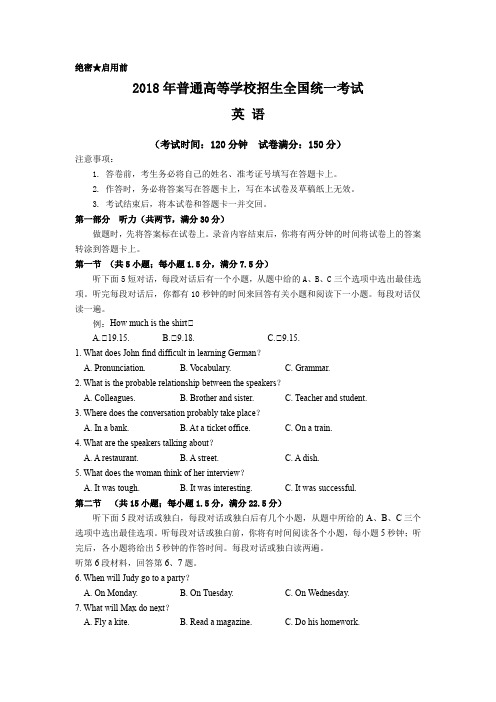
绝密★启用前2018年普通高等学校招生全国统一考试英语(考试时间:120分钟试卷满分:150分)注意事项:1. 答卷前,考生务必将自己的姓名、准考证号填写在答题卡上。
2. 作答时,务必将答案写在答题卡上,写在本试卷及草稿纸上无效。
3. 考试结束后,将本试卷和答题卡一并交回。
第一部分听力(共两节,满分30分)做题时,先将答案标在试卷上。
录音内容结束后,你将有两分钟的时间将试卷上的答案转涂到答题卡上。
第一节(共5小题;每小题1.5分,满分7.5分)听下面5短对话,每段对话后有一个小题,从题中给的A、B、C三个选项中选出最佳选项。
听完每段对话后,你都有10秒钟的时间来回答有关小题和阅读下一小题。
每段对话仅读一遍。
例:How much is the shirt?A.?19.15.B.?9.18.C.?9.15.1. What does John find difficult in learning German?A. Pronunciation.B. V ocabulary.C. Grammar.2. What is the probable relationship between the speakers?A. Colleagues.B. Brother and sister.C. Teacher and student.3. Where does the conversation probably take place?A. In a bank.B. At a ticket office.C. On a train.4. What are the speakers talking about?A. A restaurant.B. A street.C. A dish.5. What does the woman think of her interview?A. It was tough.B. It was interesting.C. It was successful.第二节(共15小题;每小题1.5分,满分22.5分)听下面5段对话或独白,每段对话或独白后有几个小题,从题中所给的A、B、C三个选项中选出最佳选项。
2018年高考英语试卷听力+原文+答案(新课标Ⅱ、Ⅲ)
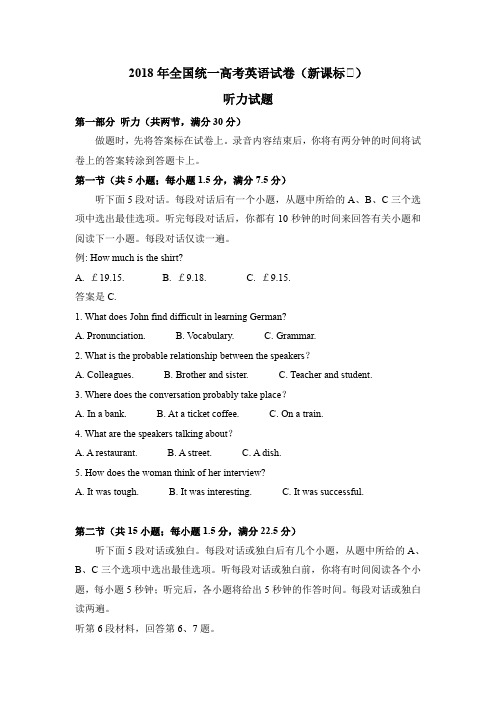
2018年全国统一高考英语试卷(新课标Ⅱ)听力试题第一部分听力(共两节,满分30分)做题时,先将答案标在试卷上。
录音内容结束后,你将有两分钟的时间将试卷上的答案转涂到答题卡上。
第一节(共5小题;每小题1.5分,满分7.5分)听下面5段对话。
每段对话后有一个小题,从题中所给的A、B、C三个选项中选出最佳选项。
听完每段对话后,你都有10秒钟的时间来回答有关小题和阅读下一小题。
每段对话仅读一遍。
例: How much is the shirt?A. £19.15.B. £9.18.C. £9.15.答案是C.1. What does John find difficult in learning German?A. Pronunciation.B. V ocabulary.C. Grammar.2. What is the probable relationship between the speakers?A. Colleagues.B. Brother and sister.C. Teacher and student.3. Where does the conversation probably take place?A. In a bank.B. At a ticket coffee.C. On a train.4. What are the speakers talking about?A. A restaurant.B. A street.C. A dish.5. How does the woman think of her interview?A. It was tough.B. It was interesting.C. It was successful.第二节(共15小题;每小题1.5分,满分22.5分)听下面5段对话或独白。
每段对话或独白后有几个小题,从题中所给的A、B、C三个选项中选出最佳选项。
2018年全国统一高考英语试卷听力+原文+答案(新课标Ⅱ、Ⅲ)
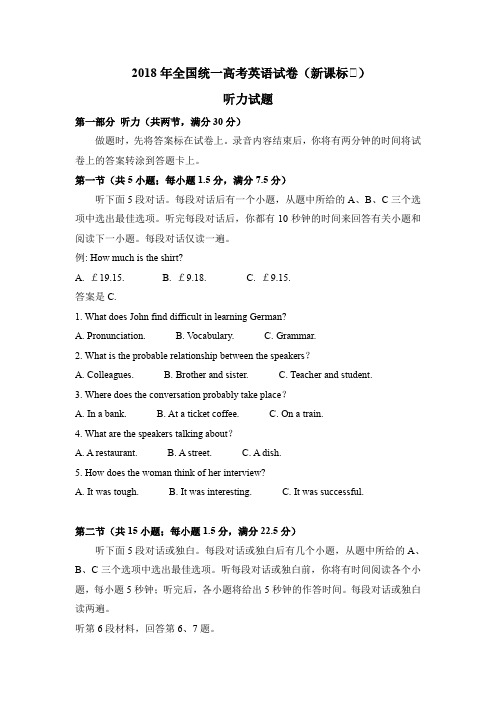
2018年全国统一高考英语试卷(新课标Ⅱ)听力试题第一部分听力(共两节,满分30分)做题时,先将答案标在试卷上。
录音内容结束后,你将有两分钟的时间将试卷上的答案转涂到答题卡上。
第一节(共5小题;每小题1.5分,满分7.5分)听下面5段对话。
每段对话后有一个小题,从题中所给的A、B、C三个选项中选出最佳选项。
听完每段对话后,你都有10秒钟的时间来回答有关小题和阅读下一小题。
每段对话仅读一遍。
例: How much is the shirt?A. £19.15.B. £9.18.C. £9.15.答案是C.1. What does John find difficult in learning German?A. Pronunciation.B. V ocabulary.C. Grammar.2. What is the probable relationship between the speakers?A. Colleagues.B. Brother and sister.C. Teacher and student.3. Where does the conversation probably take place?A. In a bank.B. At a ticket coffee.C. On a train.4. What are the speakers talking about?A. A restaurant.B. A street.C. A dish.5. How does the woman think of her interview?A. It was tough.B. It was interesting.C. It was successful.第二节(共15小题;每小题1.5分,满分22.5分)听下面5段对话或独白。
每段对话或独白后有几个小题,从题中所给的A、B、C三个选项中选出最佳选项。
(完整版)2018年高考英语全国2卷(附答案和听力原文)

每小题 5 秒钟;听完后,各小题将给出 5 秒钟的作答时间。每段对话或独白读两
遍。
听第 6 段材料,回答第 6、 7 题。
6. When will Judy go to a party ?
A. On Monday.
B. On Tuesday.
7. What will Max do next ?
A. Fly a kite.
C. Playing a computer game.
9. What do the speakers decide to do?
A. Visit Mike
. B. Go boating.
C. Take a walk.
听第 8 段材料,回答第 10 至 12 题。
10. Which color do cats see better than humans ?
听第 10 段材料,回答第 17 至 20 题。
17. At what age did Emily start learning ballet ?
A. Five.
B. Six.
18. Why did Emily move to Toronto ?
A. To work for a dance school.
B. Ed ’ s teacher.
14. How does Ed usually go to kindergarten ?
A. By car.
B. On foot.
15. What does Ed enjoy doing at the kindergarten ?
A. Telling stories.
10 秒钟的时间来回答有关小题和
阅读下一小题。每段对话仅读一遍。
2018全国卷II高考英语听力试题原文和音频MP3(含解析)

绝密★启用前 6 月8日15: 00—16:402016年普通高等学校全国统一考试英语听力第一部分听力(共两节,满分30分)第一节听下面5段对话。
每段对话后有一个小题,从题中所给的A、B、C三个选项中选出最佳选项,并标在试卷的相应位置。
听完每段对话后,你都有10秒钟的时间来回答有关小题和阅读下一小题。
每段对话仅读一遍。
1. What will Lucy do at 11:30 tomorrow?A. Go out for lun ch.B. See her den tist.C. Visit a friend.2. What is the weather like now?A. It ' s sunny.B. It ' s rainy.C. It ' s cloudy.3. Why does the man talk to Dr. Simpso n?A. To make an apology.B. To ask for help.C. To discuss his studies.4. How will the woma n get back from the railway statio n?A. By train.B. By car.C. By bus.5. What does Jenny decide to do first?A. Look for a job.B. Go on a trip.C. Get an assista nt.第二节听下面5段对话或独白。
每段对话或独白后有几个小题,从题中所给的A B、C三个选项中选出最佳选项,并标在试卷的相应位置。
听每段对话或独白前,你将有时间阅读各个小题,每小题5秒钟;听完后,各小题将给出5秒钟的作答时间。
每段对话或独白读两遍。
听第6段材料,回答第6、7题。
6. What time is it now?A. 1:45.B. 2:10.C. 2:15.7. What will the man do?A. Work on a project.B. See Linda in the library.C. Meet with Professor Smith.听第7段材料,回答第8至10题。
2018年高考英语全国2卷(附答案和听力原文)

学校:___________________________年_______班姓名:____________________学号:________---------密封线---------密封线---------绝密★启用前2018年普通高等学校招生全国统一考试英语全国II 卷(全卷共14页)(适用地区:甘肃、青海、内蒙古、黑龙江、吉林、辽宁、宁夏、新疆、陕西、重庆)注意事项:1.答卷前,考生务必将自己的姓名、考生号等填写在答题卡和试卷指定位置上。
2.回答选择题时,选出每小题答案后,用铅笔把答题卡上对应题目的答案标号涂黑。
如需改动,用橡皮擦干净后,再选涂其它答案标号,回答非选择题时,将答案写在答题卡上,写在本试卷上无效。
3.考试结束后,将本试卷和答案卡一并交回。
第一部分听力(共两节,满分30分)做题时,先将答案标在试卷上。
录音内容结束后,你将有两分钟的时间将试卷上的答案转涂到答题卡上。
第一节(共5小题;每小题1.5分,满分7.5分)听下面5段对话。
每段对话后有一个小题,从题中所给的A 、B 、C 三个选项中选出最佳选项。
听完每段对话后,你都有10秒钟的时间来回答有关小题和阅读下一小题。
每段对话仅读一遍。
例:How much is the shirt?A. £19.15.B. £9.18.C. £9.15.答案是C 。
1. What does John find difficult in learning German?A. Pronunciation.B. Vocabulary.C. Grammar.2. What is the probable relationship between the speakers ?A. Colleagues.B. Brother and sister.C. Teacher and student. 3. Where does the conversation probably take place ?A. In a bank.B. At a ticket office.C. On a train.4. What are the speakers talking about ?A.A restaurant.B.A street.C.A dish.5. What does the woman think of her interview ?A. It was tough.B. It was interesting.C. It was successful.第二节(共15小题;每小题1.5分,满分22.5分)听下面5段对话或独白。
完整word2018年高考英语全国2卷附答案和听力原文

12B-YY-00000023. Where does the conversation probably take place?绝密★启用前-_ A. In a bank. B. At a ticket office. C. On a train. 年普通高等学校招生全国统一考试2018_ _-_ 卷全国II英语 4. What are the speakers talking about?_ _-_ _A.A restaurant. B.A street. C.A dish. (全卷共14页):- 号(适用地区:甘肃、青海、内蒙古、黑龙江、吉林、辽宁、宁夏、新疆、陕西、重庆)5. What does the woman think of her interview?-学A. It was tough.B. It was interesting.C. It was successful.注意事项:- _ 卷前,考生务必将自己的姓名、考生号等填写在答题卡和试卷指定位置上。
答_1.-_ _ 第二节(共15小题;每小题1.5分,满分22.5分)答选择题时,选出每小题答案后,用铅笔把答题卡上对应题目的答案标号涂黑。
回2._-_ _ 如需改动,用橡皮擦干净后,再选涂其它答案标号,回答非选择题时,将答案写在_听下面5段对话或独白。
每段对话或独白后有几个小题,从题中所给的A、-_ _ 答题卡上,写在本试卷上无效。
_线B、C三个选项中选出最佳选项。
听每段对话或独白前,你将有时间阅读各个小题,__封试结束后,将本试卷和答案卡一并交回。
考_3._每小题5秒钟;听完后,各小题将给出5秒钟的作答时间。
每段对话或独白读两密__ 30分)第一部分听力(共两节,满分_ 遍。
_-_ 做题时,先将答案标在试卷上。
录音内容结束后,你将有两分钟的时间将试:-名卷上的答案转涂到答题卡上。
姓-听第6段材料,回答第6、7题。
-6. When will Judy go to a party?小题;每小题第一节(共51.5分,满分7.5分)- 三个选、CA听下面5段对话。
2018全国二卷听力原文

2018年高考英语听力(全国II卷)试题及原文第一节听下面5段对话.每段对话后有一个小题,从题中所给的A、B、C三个选项中选出最佳选项。
听完每段对话后,你都有10秒钟的时间来回答有关小题和阅读下一小题.每段对话仅读一遍.1. What does John find difficult in learning German?A. Pronunciation。
B。
Vocabulary.C. Grammar.2。
What is the probable relationship between the speakers?A。
Colleagues.B。
Brother and sister。
C。
Teacher and student。
3. Where does the conversation probably take place?A。
In a bank。
B。
At a ticket office。
C。
On a train.4。
What are the speakers talking about?A。
A restaurant.B。
A street.C。
A dish。
5。
What does the woman think of her interview?A. It was tough.B. It was interesting.C。
It was successful。
第二节听下面5段对话或独白。
每段对话或独白后有几个小题,从题中所给的A、B、C三个选项中选出最佳选项。
听每段对话或独白前,你将有时间阅读各个小题,每小题5秒钟;听完后,各小题将给出5秒钟的作答时间。
每段对话或独白读两遍。
听第6段材料,回答第6、7题。
6。
When will Judy go to a party?A。
On Monday.B. On Tuesday。
C。
On Wednesday。
7. What will Max do next?A. Fly a kite。
2018全卷23高考英语听力文本
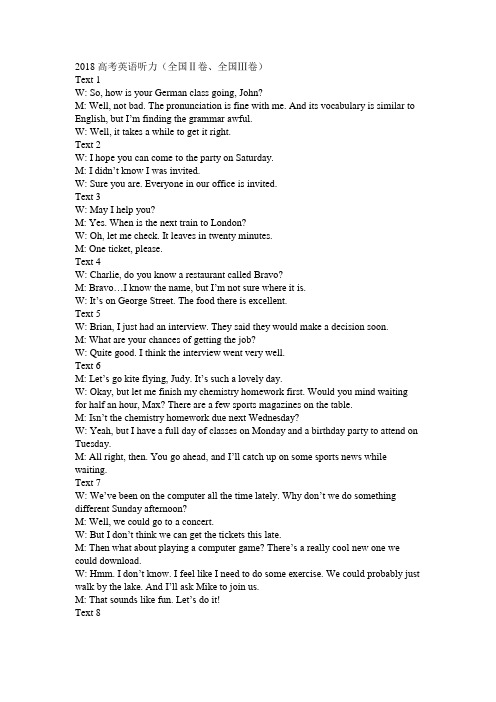
2018高考英语听力(全国Ⅱ卷、全国Ⅲ卷)Text 1W: So, how is your German class going, John?M: Well, not bad. The pronunciation is fine with me. And its vocabulary is similar to English, but I’m finding the grammar awful.W: Well, it takes a while to get it right.Text 2W: I hope you can come to the party on Saturday.M: I didn’t know I was invited.W: Sure you are. Everyone in our office is invited.Text 3W: May I help you?M: Yes. When is the next train to London?W: Oh, let me check. It leaves in twenty minutes.M: One ticket, please.Text 4W: Charlie, do you know a restaurant called Bravo?M: Bravo…I know the name, but I’m not sure where it is.W: It’s on George Street. The food there is excellent.Text 5W: Brian, I just had an interview. They said they would make a decision soon.M: What are your chances of getting the job?W: Quite good. I think the interview went very well.Text 6M: Let’s go kite flying, Judy. It’s such a lovely day.W: Okay, but let me finish my chemistry homework first. Would you mind waiting for half an hour, Max? There are a few sports magazines on the table.M: Isn’t the chemistry homework due next Wednesday?W: Yeah, but I have a full day of classes on Monday and a birthday party to attend on Tuesday.M: All right, then. You go ahead, and I’ll catch up on some sports news while waiting.Text 7W: We’ve been on the computer all the time lately. Why don’t we do something different Sunday afternoon?M: Well, we could go to a concert.W: But I don’t think we can get the tickets this late.M: Th en what about playing a computer game? There’s a really cool new one we could download.W: Hmm. I don’t know. I feel like I need to do some exercise. We could probably just walk by the lake. And I’ll ask Mike to join us.M: That sounds like fun. Let’s do i t!Text 8W: Welcome to our program, Doctor Peterson. Let’s see what questions we’ve got for you today. Here is one: Can cats see color?M: Sort of. In the wild, Many cats hunt at night because their eyes are designed for low light. Your cat can’t see brig ht colors such as red and green, but it picks up more shades of blue, yellow, and gray than humans do.W: And why do cats give dead birds to their owners?M: When your cat drops a dead bird at your feet, she isn’t bringing you a present. Most cats just dra g food home because it’s a safe place to eat. A cat’s mom also brings home things to her children to help them practice hunting. So a female cat without children may bring these “treats” to her owner instead. You may not like them, but at least you don’t h ave to write her a thank-you note.Text 9W: How is little Ed doing at the kindergarten, Jack?M: Oh, he’s doing fairly well. It’s been three weeks since he first started going. So Macy and I are pretty used to it now. You should have seen Macy cry when Ed was about to set off on the first day, though.W:I think that’s a normal reaction for mothers. You live quite close to the kindergarten, don’t you? How does he get there?M: Macy walks there with him every morning unless the weather is bad. When it rains, they’ll drive.W: And is Ed enjoying kindergarten?M: Yeah, he loves to have other kids to play with. He keeps telling us things they do together.W: What do the teachers at the kindergarten say about him?M: They said he is bright and that he’s starting to learn how to tell time.W: Isn’t that fantastic?M: That is fantastic. It sounds like everything goes well.Text 10W: My name is Emily. I had been a dancer for quite a long time. I started studying ballet when I was six years old. By the time I was nine, I was dancing five days a week. When I was eighteen, I decided that I really preferred contemporary dance and that I wanted to do it professionally. So I applied successfully for the training program at the school of Toronto Dance Theatre, and moved to Toronto to attend the program. That was the period of time I enjoyed most in Toronto. I graduated on scholarship and danced professionally for ten years. But after all those years, I found that dance was gradually becoming something that felt like more of a burden than a joy. I found myself increasingly unwilling to drag myself to dance performances, so I quit. I do miss dance often, but it makes me happy to think that I’ll never have to go to another training session again.。
2018全国卷2+3听力
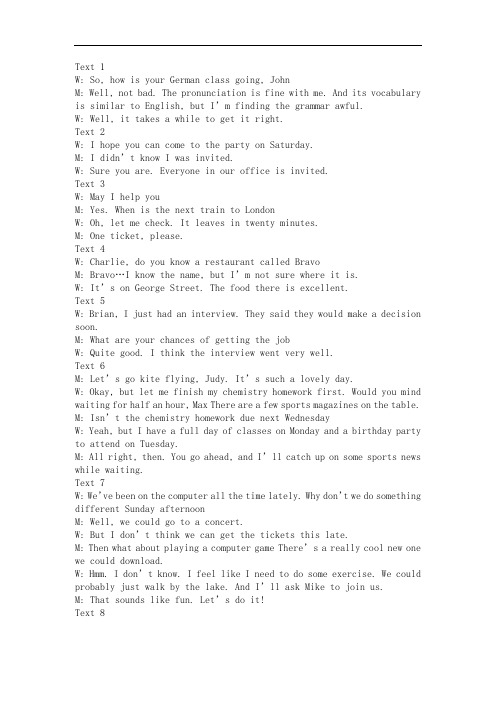
Text 1W: So, how is your German class going, JohnM: Well, not bad. The pronunciation is fine with me. And its vocabulary is similar to English, but I’m finding the grammar awful.W: Well, it takes a while to get it right.Text 2W: I hope you can come to the party on Saturday.M: I didn’t know I was invited.W: Sure you are. Everyone in our office is invited.Text 3W: May I help youM: Yes. When is the next train to LondonW: Oh, let me check. It leaves in twenty minutes.M: One ticket, please.Text 4W: Charlie, do you know a restaurant called BravoM: Bravo…I know the name, but I’m not sure where it is.W: It’s on George Street. The food there is excellent.Text 5W: Brian, I just had an interview. They said they would make a decision soon.M: What are your chances of getting the jobW: Quite good. I think the interview went very well.Text 6M: Let’s go kite flying, Judy. It’s such a lovely day.W: Okay, but let me finish my chemistry homework first. Would you mind waiting for half an hour, Max There are a few sports magazines on the table. M: Isn’t the chemistry homework due next WednesdayW: Yeah, but I have a full day of classes on Monday and a birthday party to attend on Tuesday.M: All right, then. You go ahead, and I’ll catch up on some sports news while waiting.Text 7W: We’ve been on the computer all the time lately. Why don’t we do something different Sunday afternoonM: Well, we could go to a concert.W: But I don’t think we can get the tickets this late.M: Then what about playing a computer game There’s a really cool new one we could download.W: Hmm. I don’t know. I feel like I need to do some exercise. We could probably just walk by the lake. And I’ll ask Mike to join us.M: That sounds like fun. Let’s do it!Text 8W: Welcome to our program, Doctor Peterson. Let’s see what questions we’ve got for you today. Here is one: Can cats see colorM: Sort of. In the wild, Many cats hunt at night because their eyes are designed for low light. Your cat can’t see bright colors such as red and green, but it picks up more shades of blue, yellow, and gray than humans do.W: And why do cats give dead birds to their ownersM: When your cat drops a dead bird at your feet, she isn’t bringing you a present. Most cats just drag food home because it’s a safe place to eat. A cat’s mom also brings home things to her children to help them practice hunting. So a female cat without children may bring these “treats” to her owner instead. You may not like them, but at least you don’t have to write her a thank-you note.Text 9W: How is little Ed doing at the kindergarten, JackM: Oh, he’s doing fairly well. It’s been three weeks since he first started going. So Macy and I are pretty used to it now. You should have seen Macy cry when Ed was about to set off on the first day, though.W:I think that’s a normal reaction for mothers. You live quite close to the kindergarten, don’t you How does he get thereM: Macy walks there with him every morning unless the weather is bad. When it rains, they’ll drive.W: And is Ed enjoying kindergartenM: Yeah, he loves to have other kids to play with. He keeps telling us things they do together.W: What do the teachers at the kindergarten say about himM: They said he is bright and that he’s starting to learn how to tell time.W: Isn’t that fantasticM: That is fantastic. It sounds like everything goes well.Text 10W: My name is Emily. I had been a dancer for quite a long time. I started studying ballet when I was six years old. By the time I was nine, I was dancing five days a week. When I was eighteen, I decided that I really preferred contemporary dance and that I wanted to do it professionally. So I applied successfully for the training program at the school of Toronto Dance Theatre, and moved to Toronto to attend the program. That was the period of time I enjoyed most in Toronto. I graduated on scholarship and danced professionally for ten years. But after all those years, I found that dance was gradually becoming something that felt like more of a burden than a joy. I found myself increasingly unwilling to drag myself to dance performances, so I quit. I do miss dance often, but it makes me happy to think that I’ll never have to go to another training session again.。
实用文库汇编之全国二卷听力原文

*作者:于椅上*作品编号:785632589421G 101创作日期:2020年12月20日实用文库汇编之2018年高考英语听力(全国II卷)试题及原文第一节听下面5段对话。
每段对话后有一个小题,从题中所给的A、B、C三个选项中选出最佳选项。
听完每段对话后,你都有10秒钟的时间来回答有关小题和阅读下一小题。
每段对话仅读一遍。
1. What does John find difficult in learning German?A. Pronunciation.B. Vocabulary.C. Grammar.2. What is the probable relationship between the speakers?A. Colleagues.B. Brother and sister.C. Teacher and student.3. Where does the conversation probably take place?A. In a bank.B. At a ticket office.C. On a train.4. What are the speakers talking about?A. A restaurant.B. A street.C. A dish.5. What does the woman think of her interview?A. It was tough.B. It was interesting.C. It was successful.第二节听下面5段对话或独白。
每段对话或独白后有几个小题,从题中所给的A、B、C三个选项中选出最佳选项。
听每段对话或独白前,你将有时间阅读各个小题,每小题5秒钟;听完后,各小题将给出5秒钟的作答时间。
每段对话或独白读两遍。
听第6段材料,回答第6、7题。
6. When will Judy go to a party?A. On Monday.B. On Tuesday.C. On Wednesday.7. What will Max do next?A. Fly a kite.B. Read a magazine.C. Do his homework.听第7段材料,回答第8、9题。
2018(全国Ⅱ卷、全国Ⅲ卷)听力真题、原文及答案

2018全国卷2及卷3 听力真题1. What does John find difficult in learning German?A. Pronunciation.B. Vocabulary.C. Grammar.2. What is the probable relationship between the speakers?A. Colleagues.B. Brother and sister.C. Teacher and student.3. Where does the conversation probably take place?A. In a bank.B. At a ticket office.C. On a train.4. What are the speakers talking about?A. A restaurant.B. A street.C. A dish.5. What does the woman think of her interview?A. It was tough.B. It was interesting.C. It was successful.第二节 (共15小题;每小题1.5分,满分22.5分)听下面5段对话或独白。
每段对话或独白后有几个小题,从题中所给的A、B、C 三个选项中选出最佳选项,并标在试卷的相应位置。
听每段对话或独白前,你将有时间阅读各个小题,每小题5秒钟;听完后,各小题将给出5秒钟的作答时间。
每段对话或独白读两遍。
听第6段材料,回答第6、7题。
6. When will Judy go to a party?A. On Monday.B. On Tuesday.C. On Wednesday.7. What will Max do next?A. Fly a kite.B. Read a magazine.C. Do his homework.听第7段材料,回答第8、9题。
- 1、下载文档前请自行甄别文档内容的完整性,平台不提供额外的编辑、内容补充、找答案等附加服务。
- 2、"仅部分预览"的文档,不可在线预览部分如存在完整性等问题,可反馈申请退款(可完整预览的文档不适用该条件!)。
- 3、如文档侵犯您的权益,请联系客服反馈,我们会尽快为您处理(人工客服工作时间:9:00-18:30)。
2018年高考英语听力(全国II卷)试题及原文第一节听下面5段对话。
每段对话后有一个小题,从题中所给的A、B、C三个选项中选出最佳选项。
听完每段对话后,你都有10秒钟的时间来回答有关小题和阅读下一小题。
每段对话仅读一遍。
1. What does John find difficult in learning GermanA. Pronunciation.B. Vocabulary.C. Grammar.2. What is the probable relationship between the speakersA. Colleagues.B. Brother and sister.:C. Teacher and student.3. Where does the conversation probably take placeA. In a bank.B. At a ticket office.C. On a train.4. What are the speakers talking aboutA. A restaurant.B. A street.C. A dish.5. What does the woman think of her interview;A. It was tough.B. It was interesting.C. It was successful.第二节听下面5段对话或独白。
每段对话或独白后有几个小题,从题中所给的A、B、C三个选项中选出最佳选项。
听每段对话或独白前,你将有时间阅读各个小题,每小题5秒钟;听完后,各小题将给出5秒钟的作答时间。
每段对话或独白读两遍。
听第6段材料,回答第6、7题。
6. When will Judy go to a partyA. On Monday.B. On Tuesday.C. On Wednesday.,7. What will Max do nextA. Fly a kite.B. Read a magazine.C. Do his homework.听第7段材料,回答第8、9题。
8. What does the man suggest doing at firstA. Going to a concert.B. Watching a movie.C. Playing a computer game.9. What do the speakers decide to do>A. Visit Mike.B. Go boating.C. Take a walk.听第8段材料,回答第10至12题。
10. Which color do cats see better than humansA. Red.B. Green.C. Blue.11. Why do cats bring dead birds homeA. To eat them in a safe place.!B. To show off their hunting skills.C. To make their owners happy.12. How does the man sound at the end of the conversationA. Grateful.B. Humorous.C. Curious.听第9段材料,回答第13至16题。
13. Who is MacyA. Ed’s mother.B. Ed’s teacher.·C. Ed’s friend.14. How does Ed usually go to kindergartenA. By car.B. On foot.C. By bus.15. What does Ed enjoy doing at the kindergartenA. Telling stories.B. Singing songs.C. Playing with others.16. What do the teachers say about Ed【A. He’s clever.B. He’s quiet.C. He’s brave.听第10段材料,回答第17至20题。
17. At what age did Emily start learning balletA. Five.B. Six.C. Nine.18. Why did Emily move to TorontoA. To work for a dance school.}B. To perform at a dance theater.C. To learn contemporary dance.19. Why did Emily quit dancingA. She was too old to dance.B. She failed to get a scholarship.C. She lost interest in it.20. How does Emily feel about stopping trainingA. She’s pleased.B. She’s regretful.C. She’s upset.\1~5 CABAC 6~10 BBACC 11~15 ABABC 16~20 ABCCA原文Text 1W: So, how is your German class going, JohnM: Well, not bad. The pronunciation is fine with me, and its vocabulary is similar to English. But I’m finding the grammar awful.<W: Well, it takes a while to get it right.Text 2W: I hope you can come to the party on Saturday.M: I didn’t know I was invited.W: Sure you are. Everyone in our office is invited.Text 3W: May I help youM: Yes. When is the next train to LondonW: Oh, let me check. It leaves in twenty minutes.M: One ticket, please.?Text 4W: Charlie, do you know a restaurant called BravoM: Bravo…I know the name. But I’m not sure where it is.W: It’s on George Street. The food there is excellent.Text 5W: Brian, I just had an interview. They said they would make a decision soon.M: What are your chances of getting the jobW: Quite good. I think the interview went very well.Text 6M: Let’s go kite flying, Judy. It’s such a lovely day.]W: Okay, but let me finish my chemistry homework first. Would you mind waiting for half an hour, Max There are a few sports magazines on the table.M: Isn’t the chemistry homework due next WednesdayW: Yeah, but I have a full day of classes on Monday and a birthday party to attend on Tuesday.M: All right, then. You go ahead, and I’ll catch up on some sports news while waiting.W: We’ve been on the computer all the time lately. Why don’t we do something different Sunday afternoonM: Well, we could go to a concert.W: But I don’t think we can get the tickets this late.M: Then what about playing a computer game There’s a really cool new one we could download.W: Hmm, I don’t know. I feel like I need to do some exercise. We could probably just walk by the lake, and I’ll ask Mike to join us.>M: That sounds like fun. Let’s do it!Text 8W: Welcome to our program, Dr. Peterson. Let’s see what questions we’ve got for you today. Here’s one: Can cats see colorM: Sort of. In the wild, many cats hunt at night because their eyes are designed for low light. Your cat can’t see bright colors such as red and green. But it picks up more shades of blue, yellow, and grey than humans do.W: And why do cats give dead birds to their ownersM: When your cat drops a dead bird at your feet, she isn’t bringin g you a present. Most cats just drag food home because it’s a safe place to eat. A cat’s mom also brings home things to her children to help them practice hunting. So, a female cat without children may bring these “treats” to her owner instead. You may not like them, but at least you don’t have to write her a thank-you note. Text 9W: How is little Ed doing at the kindergarten, JackM: Oh, he’s doing fairly well. It’s been three weeks since he first started going, so Macy and I are pretty used to it now. You should have seen Macy cry when Ed was about to set off on the first day, though.W: I think that’s a normal reaction for mothers. You live quite close to the kindergarten, don’t you How does he get thereM: Macy walks there with him every morning unless the weather is bad.When it rains, they’ll drive.W: And is Ed enjoying kindergartenM: Yeah, he loves to have other kids to play with. He keeps telling us things they do together.W: What do the teachers at the kindergarten say about himM: They said he’s bright, and that he’s starting to learn how to tell time. Isn’t that fantasticW: That is fantastic. It sounds like everything goes well.My name is Emily. I had been a dancer for quite a long time. I started studying ballet when I was six years old. By the time I was nine, I was dancing five days a week. When I was eighteen, I decided that I really preferred contemporary dance and that I wanted to do it professionally. So I applied successfully for the training program at the School of Toronto Dance Theatre, and moved to Toronto to attend the program. That was the period of time I enjoyed most in Toronto. I graduated on scholarship and danced professionally for ten years. But after all those years, I found that dance was gradually becoming something that felt like more of a burden than a joy. I found myself increasingly unwilling to drag myself to dance performances, so I quit.I do miss dance, often. But it makes me happy to think that I’ll never have to go to another training session again.。
